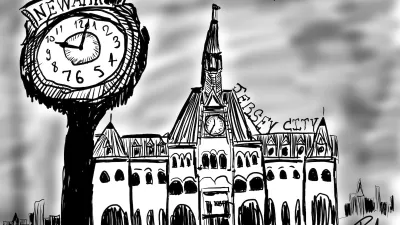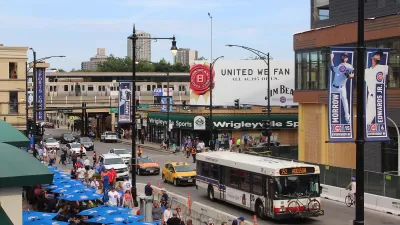Sports teams often coerce cities into contributing public funds toward the building of new stadiums. Numerous reports indicate that it's a bad deal for cities with little to no positive economic impact, writes Neal DeMause.
Cities have been contributing public funds to sports stadiums with promises that the stadiums will revitalize areas and be an economic boon, but the data doesn't back up those claims.
"Studies demonstrating pro sports stadiums' slight economic impact go back to 1984, the year Lake Forest College economist Robert Baade examined thirty cities that had recently constructed new facilities. His finding: in twenty-seven of them, there had been no measurable economic impact; in the other three, economic activity appeared to have decreased."
It seems that fear of losing sports teams will drive most cities to do just about anything to keep a team. In addition to funding a stadium, the perks for teams include subsidies, tax breaks, and loans: "they added an average of 40 percent to sports facilities' public sticker price."
In addition to all the obvious deals, cities are often out-maneuvered by team lawyers that sweeten the deal with outrageous perks that are to the detriment of the city including clauses that require a stadium to remain "state-of-the-art" or else a team could break its lease.
Until cities decide to work together and not compete for teams, the stadium blitzes will likely continue, says DeMause.
Thanks to Cathie Pagano
FULL STORY: Why Do Mayors Love Sports Stadiums?

Trump Administration Could Effectively End Housing Voucher Program
Federal officials are eyeing major cuts to the Section 8 program that helps millions of low-income households pay rent.

Planetizen Federal Action Tracker
A weekly monitor of how Trump’s orders and actions are impacting planners and planning in America.

Ken Jennings Launches Transit Web Series
The Jeopardy champ wants you to ride public transit.

California Invests Additional $5M in Electric School Buses
The state wants to electrify all of its school bus fleets by 2035.

Austin Launches $2M Homelessness Prevention Fund
A new grant program from the city’s Homeless Strategy Office will fund rental assistance and supportive services.

Alabama School Forestry Initiative Brings Trees to Schoolyards
Trees can improve physical and mental health for students and commnity members.
Urban Design for Planners 1: Software Tools
This six-course series explores essential urban design concepts using open source software and equips planners with the tools they need to participate fully in the urban design process.
Planning for Universal Design
Learn the tools for implementing Universal Design in planning regulations.
Ada County Highway District
Clanton & Associates, Inc.
Jessamine County Fiscal Court
Institute for Housing and Urban Development Studies (IHS)
City of Grandview
Harvard GSD Executive Education
Toledo-Lucas County Plan Commissions
Salt Lake City
NYU Wagner Graduate School of Public Service





























